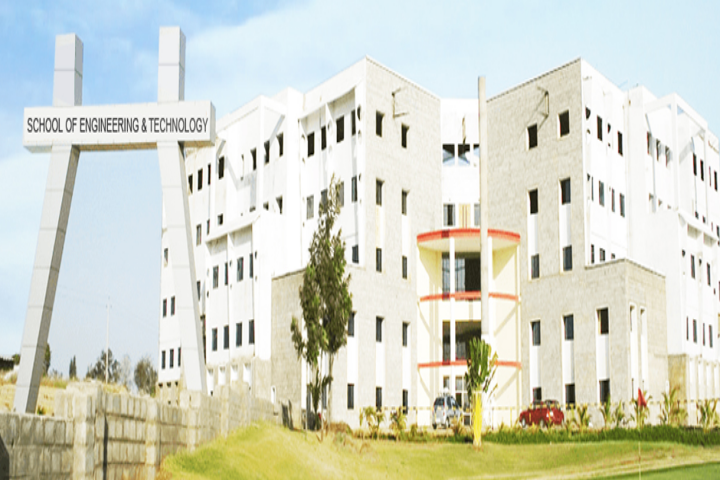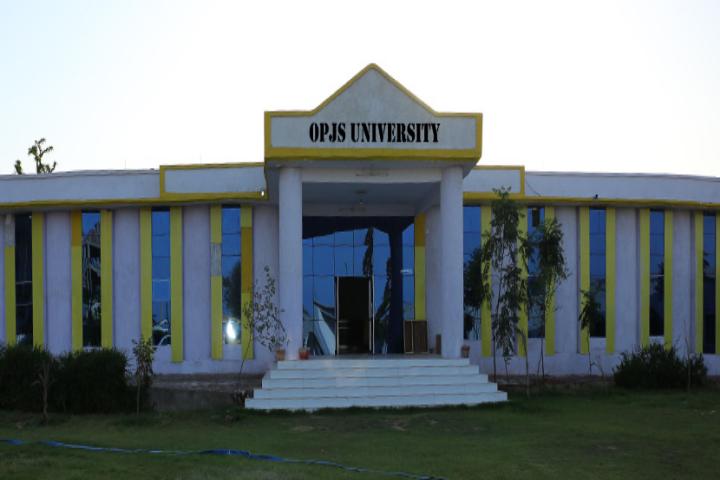
Nano Technology and Robotics Course Details - Fees, Subjects, Syllabus, Duration, Eligibility, Career Scope
Degrees offered: Ph.D, M.Sc., B.E /B.Tech, B.Sc., Dual Degree
What is Nano Technology and Robotics
What is Nano Technology and Robotics?
To explain Nano Technology and Robotics, let us first understand what is nano and robotics means to get a better idea of it. “Nano” means “one-billionth part of”, or, in this context “one-billionth of a meter”. Therefore, Nano Technology is the study of technology, science, and engineering at the nanoscale. While robotics has been defined by experts as the point where science, technology, and engineering intersect. Robots involve interdisciplinary research along with the design, construction, operation, and application of these intelligent advanced machines which assist humans with their day-to-day tasks. Therefore, the Nano Technology and Robotics field of study is based on research and innovation with regards to building devices and materials on the scale of molecules and atoms.
Nano Technology and Robotics is being used worldwide, particularly in developing countries, for solutions in the healthcare sector, in industrial and purification processes, and in electronics.
Eligibility Criteria (UG & PG) of Nano Technology and Robotics
Eligibility Criteria For UG Courses in Nano Technology and Robotics:
In order to apply for nanotechnology course, candidates have to completed their class 12th or equivalent degree with minimum 60% marks. Further, they need to apply for relevant entrance exams based on the requirements of the colleges they want to apply for. However, for robotics, candidates who have completed class 12th exam or any equivalent examination with minimum aggregate marks of 55% are eligible. Additionally, their core subjects for class 12 must be Physics, Chemistry, and Mathematics.
Eligibility Criteria For PG Courses in Nano Technology and Robotics:
For nanotechnology, candidates are eligible if they have completed a Bachelor’s course in engineering or technology, in any discipline, with a minimum aggregate score of 50%. Candidates are eligible if they have completed a Bachelor’s degree (BE/B.Tech) in a relevant discipline with a minimum aggregate of 55% from a recognized institute for robotics.
Entrance Exams for Nano Technology and Robotics
For Nano Technology and Robotics Undergraduate courses
IIT-Joint Entrance Examination (JEE)- JEE is a national-level engineering entrance exam conducted for students who have completed their 10+2 exam. The JEE is conducted in two stages, JEE Main and JEE Advanced. The former is conducted for all applicants, and those who achieve the minimum cut-off score are then eligible to appear for JEE Advanced. The JEE Advanced score helps students gain admission into the top engineering colleges of the country.
Birla Institute of Technology and Science Admission Test (BITSAT)- A computer-based examination conducted for admission into BITS, one of the top engineering colleges in India, BITSAT is almost as competitive as the JEE. A student’s BITSAT score can decide their admission into any one of the BITS campuses in Pilani, Goa, and Hyderabad.
Vellore Institute of Technology Engineering Entrance Exam (VITEEE)- An engineering entrance examination conducted specifically for admission into VIT, and the VITEEE is a computer-based test conducted once every year. Based upon their rank in the examination, students are selected to study either in the Vellore campus of the institute or in Chennai.
For Nano Technology and Robotics Postgraduate courses
Graduate Aptitude Test in Engineering (GATE)- A post-graduate specific national level examination, the GATE is conducted yearly for engineering graduates who wish to pursue an ME/MTech from one of the best colleges in the country. A highly competitive examination, the GATE tests the aptitude of students along with their knowledge of the specific field of engineering in which they have completed their Bachelor’s degree.
College Predictors VIEW ALL
Scope of Nano Technology and Robotics in India and Abroad
Scope in India and Abroad of Nano Technology and Robotics
Nano Technology and Robotics is emerging as a life-altering field of study, having already made a tremendous impact on many aspects of our daily lives.
The job sectors in Nano Technology and Robotics are numerous, including food science, medicine, environmental observing, forensics, military, and national security, electronics, and energy storage, among many others. With the technology yet to emerge in all its glory, the scope and opportunities in Nano Technology and Robotics sector can only increase in the future. Robotics engineering, as a career, is high-end and prestigious. The job opportunities are countless, and there are employment opportunities in laboratories, manufacture, medicine, mining, automation, life sciences, aerospace, agriculture, so on and so forth. The demand for professionals in the Nano Technology and Robotics domain is high and the scope for a career, both in India and abroad, is increasingly high.
Course Fees Nano Technology and Robotics
| Minimum Fees | Maximum Fees | |||
|---|---|---|---|---|
| Private | Government | Private | Government | |
| UG | ||||
| PG | ||||
| DOCTORAL | ||||
Course Subjects
Subjects Covered Under Nano Technology and Robotics?
Nano Technology and Robotics is a specialized branch of engineering wherein projects and practical training are given significant weightage to ensure all-round knowledge and development of students taking the course.
Some of the main subjects covered in Nano Technology and Robotics course are:
Engineering Graphics
Elements of Nanoscience and Nanotechnology
Synthesis and Characterization of Nanomaterials
Fundamentals of Nanotechnology
Semiconductor Device Theory and Modeling
Nano-electronics
Computational Methods
Study of Fabrication and Processing Methods
Study of Nano-electronic devices
Nano-Environment and Ethical Issues
Microelectronics and Nanoelectronics
Electronic Devices and Digital Circuits
Computer Programming
Automatic Control Systems
Strength of Machine Elements
Design of Machine Elements
Flexible Manufacturing Systems
Power Electronics
Microprocessors and Controllers
Advanced Robotics
Hydraulic and Pneumatic
Engineering Measurement and Instrumentation
Industrial Safety
Sensors and Signal
Programming Industrial Automation Systems
Apart from this, students are also required to undergo a six-month industrial training as part of the Nano Technology and Robotics course. In a Master’s degree course in Nano Technology and Robotics, a project in the third semester and a dissertation in the last semester is a mandatory part of the course curriculum.
Careers in Nano Technology and Robotics
Careers in Nano Technology and Robotics
With nanoscale engineering and science creating enormous ripples in numerous industries, the career opportunities in Nano Technology and Robotics are constantly expanding rapidly. In a field of work as diverse as Nano Technology and Robotics, one can explore many different options and never get stuck with one area of work or research. The demand for more educated, well-trained professionals in Nano Technology and Robotics ensures that the opportunity to do more never runs out.
Robotics has for long captivated engineers across the world with the myriad possibilities it brings to the table, and technology is expected to see many more breakthroughs owing to robotics in the near future. Available jobs for professionals who can take on and execute work in the Nano Technology and Robotics domain are abundant all across the world. In addition to being a fascinating field of research and work, a career in Nano Technology and Robotics also promises a comfortable lifestyle for professionals working at various levels in the area.
Upcoming trends
Upcoming Trends in Nano Technology and Robotics
Nano Technology and Robotics converge, we have Nanorobotics. The first Nanorobotic system was introduced in 1997 and the idea of making a gradual ascent up the emerging trends ladder. Robotics for Nanotechnology is an idea enabling production in several varieties of operations and items. Nano-positioning robotics are useful in numerous different processes, including the assembling of fibre optic components. Other examples of applications of robotics in the nanotechnology sector include the integration of robotic nano-manipulators in powerful scanning electron microscopes. This application is very useful in the integrated circuit market.
Nanorobots are also used for the manipulation of contacts 100 nanometers long, and with time, even these are getting smaller. Nano-manipulation is also widely applicable in “pick and place” operations for building of, for instance, optical systems like spectrometers. In this context, a robot is used to control a very high-power electron microscope to achieve superior resolution. Today, Nano Technology and Robotics is capable of working at the nanoscale has made possible the production of semiconductors and other tiny electronic devices. Soon, research in Nano Technology and Robotics area can be expected to see many more innovative applications in the market.
Job Profiles and Top Recruiters
Job Profiles Offered to Nano Technology and Robotics Graduates
Apart from the fact that both Nano Technology and Robotics are highly prestigious and lucrative career fields, many top job recruiters seek out these candidates and provide them with valuable opportunities to enter the field and make their way through any industry they wish to work with.
Job opportunities for Nano Technology and Robotics graduates are available in numerous fields, and typically the job profiles offered for these candidates include:
Job Profile | Description |
Nanotechnologist in Manufacturing | In manufacturing, nanotechnology is being implemented in many different aspects of technological engineering, for example, military weapons, communications, computers, etc. |
Nanotechnologist in Food Science | Nanotechnology is used in food science to find solutions to crop failure problems and in the food processing and preparation procedures. |
Medical Scientist and Technician | Use nanotechnology in treatments of various kinds of patients, including potential cures and repairing damage to cells. This area of work is still partly theoretical or being researched. |
Research Associate | Carrying out extensive research in areas concerned with nanotechnology. |
Top Recruiters in Nano Technology and Robotics Field
Cranes Software International Limited
Johnson & Johnson
Council of Scientific and Industrial Research
Minatec
Qtech Nanosystems
Monad Nanotech Pvt. Ltd.
Yashnanotech
Innovations Unified Technology
Nanobio Chemicals
Nanoshel
Velbionanotech
Micromaterials Private Limited
Talking about robotics, various industries recruit candidates for numerous different roles, such as:
Job Profile | Description |
Design of prototypes, building and testing of machines, maintenance of software that controls these machines. | |
Robotics Test Engineer | Generation and review of test plans, creating infrastructure and tools for automation of the error detection and debugging mechanism, planning and executing systematic tests of machines and their parts |
Senior Robotics Specialist | Supervising design, building and testing procedures. |
Robotics Technician | The building, maintenance, testing and repairing of robots and robotic systems. May also work with engineers to assemble and test robots, and troubleshoot any issues that arise. |
Robotics Programmer | Design of software that controls the robotic system’s actions and functions. |
Top recruiters in Robotics Field
NASA
TATA
DiFACTO Robotics and Automation
BARC
Tech Mahindra Ltd
ISRO
Kuka Robotics
BHEL
Average Salary
Average Salary in Nano Technology and Robotics Field
Nanotechnology
Job Profile | Average Annual Salary |
Nanotechnologist in Manufacturing | Rs. 6 Lakhs p.a. (Approx.) |
Nanotechnologist in Food Science | Rs. 5.18 Lakhs p.a. (Approx.) |
Medical Scientist and Technician | Rs. 2.15 Lakhs p.a. (Approx.) |
Research Associate | Rs. 1.92 Lakhs p.a. (Approx.) |
Robotics
Job Profiles | Average Annual Salary |
Robotics Design Engineer | Rs. 3.52 - 4.60 Lakhs p.a. (Approx.) |
Robotics Test Engineer | Rs. 4.14 - 6.02 Lakhs p.a. (Approx.) |
Robotics System Engineer | Rs. 4.43 Lakhs p.a. (Approx.) |
Senior Robotics Specialist | Rs. 21 Lakhs p.a. (Approx.) |
Robotics Technician | Rs. 1.92 - 2.04 Lakhs p.a. (Approx.) |
Robotics Programmer | Rs. 5.64 Lakhs p.a. (Approx.) |
Required Skillset for Nano Technology and Robotics
Skillsets Required for Nano Technology and Robotics
Nano Technology and Robotics engineers must possess certain skills that ensure success in the career field, including:
Strong analytical skills- Nanotechnology engineers have to review data for research and the products they create, in terms of efficiency.
Problem-solving skills- When designs need alterations or improvement in performance, nanotechnology engineers need to develop the most effective strategies to deal with the problem.
Communication skills- In any career field, communication is an essential soft skill. In Nanotechnology, engineers are required to communicate their research and test results with others in the field.
Attention to detail- In a career where precision is a necessity, these engineers must possess skills of attention to detail to ensure accuracy in their work.
Along with these, candidates must also possess the following skills for Nano Technology and Robotics course also:
Ability to assemble and disassemble robots
Robots repair services
Analysis of prototypes
Providing strong technical support
Inspection of robot production components
Programming robots to enable them to perform different tasks
Training technicians
Detecting sources for malfunction in robots
Testing robots
Keeping correct records and reports
Conducting research work in the field
Course Curriculum for Nano Technology and Robotics
Nano Technology and Robotics: Course and Curriculum
Nano Technology and Robotics is a multidisciplinary course of study involving the study of nanoscale materials. The course includes plenty of projects and lab work for practical training.
Completion of the Nano Technology and Robotics course makes students industry-ready, and they can be employed as nanotechnologists in any industry, ranging from aerospace or auto industries to medicine or forensics. A dynamically expanding research area, aspirants who wish to work in nanotechnology have plenty of research opportunities available. A robotics course can open up many doors(career opportunities) for candidates. Robotics courses aim to provide students with the knowledge and hands-on training with advanced algebraic tools for describing motion. Students pursuing nanotechnology and robotics course are trained to design and analyze motion for articulated systems by making appropriate calculations.
Finally, Nano Technology and Robotics students develop the ability to make use of relevant software tools for the design and analysis of complete robotic systems.
Popular Nano Technology and Robotics Entrance Exams in India
COMEDK UGET
Exam Date: 10 May, 2025
TS EAMCET
Exam Date: 29 Apr, 2025
Frequently Asked Questions (FAQs)
Question: What is the future and scope of nanotechnology and robotics?
Answer :
Nanotechnology and robotics are the future and are essential for any further development of humanity in their pursuit of not only being a greater civilization but also to survive as the resources on Earth are depleting we would need to go and explore outer space and due to the tremendous differences between our planet and theirs the only option is to deploy robots which are equipped with superior intelligence and can repair each other which exploring for us. And while that deals with the larger aspects nanotechnology will be good for the smaller aspects. Thus, making nanotechnology and robotics courses an essential part of our future.
Question: What entrance exams can one take to join a course in nanotechnology and robotics?
Answer :
For Undergraduate courses:
Joint Entrance Examination (JEE)
Vellore Institute of Technology Engineering Entrance Exam (VITEEE)
Birla Institute of Technology and Science Admission Test (BITSAT)
For Postgraduate courses:
Graduate Aptitude Test in Engineering (GATE)
Are some of the entrance exams one can take to join a course in Robotics and Nanotechnology.
Question: Can I learn robotics on my own?
Answer :
While it’s true that a college degree is essential for a career in robotics, this isn’t to say that one cannot explore Robotics as a hobby before college.
Many students build their robots after teaching themselves the necessary concepts, well before reaching college level. The necessary concepts in this context would include physics, coding, computer science, or linear algebra.
Question: What type of education do I need for a career in nanotechnology and robotics?
Answer :
A common misconception is that without at least a Master’s degree, one can only go so far in any career field. In an experience-driven, practical application-based career like nanotechnology and robotics, with a mere Bachelor’s degree, candidates can build a stellar career by gaining as much experience as possible and utilizing this experience in whichever job role they work for.
By striving to bring in innovation and creativity, you automatically become an asset to any company you work for, and can soon shoot to the top ranks.
Question: How do you know if you are suitable for a career in robotics?
Answer :
With the right skillset and sufficient training, anybody who is excited by the idea of robotics transforming the technology landscape is suitable for a career in Robotics.
The zeal to learn, to design and build, to see one’s creation in action- this drives robotics engineers into doing what they do and excelling at it.
Questions related to Nano Technology and Robotics
Can I study nanotecnology and robotics after my degree in physics?what should be my next step?
Hello dear aspirant.
For your kind information let me inform you that yes you can take nanotechnology and robotics along with your degree side by side in physics. But for this you simply need to have be in a college where this facility is available like GLA UNIVERSITY Mathura. Here you can study both along with mechanical engineering.
Ok good luck
whats the difference between Mechatronics with specialisation in robotics & Robotics and automation
Mechatronics is multidisciplinary between mechanical, electronics and computer engineering.
Mechatronics is the closest to robotics with the slight and main difference in mechatronics systems inputs are provided whereas in robotics systems it acquires the inputs by their own.
Robotics can be considered as part of Mechatronics as it involves these mechanical, electronics and computer engineering fields.
What course should i choose after inter to study robotics ,artificial engineering and nanotechnology??
What is the difference between nano technology engineering and nano technology and robotics
Hii sharma
the nano technology deals with science and technology of creating nanoparticles and of manufacturing machines which have sizes within the range of nanometres
While nano technology robotics
the science and technology of designing and manufacturing nanoscale machines, especially robotic machines
Regards
Nano Technology Engg. in which college in Kerala?
The list of various Nano Technology Engineering colleges in Kerala are ;
- School of Nano Science and Technology
- Computer Science and Engineering Department Amal Jyothi.
- International and Inter University Centre of Nanoscience and Nanotechnology.
- Sahrdaya College of Engineering and Technology.
All the best













 Answer later
Answer later












